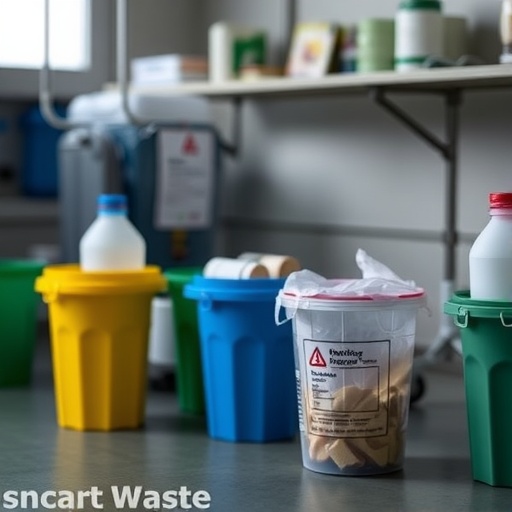In an ambitious effort to address the multifaceted challenges of healthcare waste management, a new study conducted by researchers including Jungbluth, Wright, and Bragge reveals a groundbreaking behaviour identification method aimed at refining protocols in managing hospital waste. This innovative research, documented in the journal BMC Health Services Research, spotlights critical findings from a detailed case study involving hospitals in Australia. The urgency of optimizing waste management practices in healthcare facilities has surged, catalyzed by increasing environmental concerns and regulatory pressures.
The handling of healthcare waste is a complex issue that affects not only the efficiency of medical facilities but also public health and environmental sustainability. Hospital waste includes a variety of materials, ranging from hazardous items such as needles and vials, to general refuse. Improper disposal of these materials can lead to dire consequences: contamination of air and groundwater, increased infection risks, and even hazardous incidents such as needle stick injuries. Hence, developing an effective behaviour identification method is key to fostering a culture of responsible waste management.
Central to the study is the concept of behaviour identification, which focuses on understanding and reorganizing the actions that lead to improved waste management outcomes. The researchers meticulously examined existing waste management protocols, uncovering gaps and inefficiencies that could be bridged through adjusted behaviours. The findings therein underscore that waste management is not merely a procedural or bureaucratic task; it is deeply entwined with the day-to-day actions of healthcare professionals.
Through their analyses, the study’s authors recognized that previous attempts at enhancing waste management in healthcare often fell short due to a lack of insight into the specific behaviours that contribute to effective practices. By prioritizing behaviour identification, they aim to mitigate the confusion and ambivalence that often surround waste classifications and disposal routines among hospital staff. This is particularly vital within fast-paced hospital environments where the constant influx of patients and procedures can lead to oversight in waste management.
Furthermore, the research incorporates elements of behavioural psychology, emphasizing how training and education can instill a sense of responsibility among healthcare workers. By understanding what drives their choices and actions regarding waste disposal, staff are more likely to adopt best practices consistently. The authors propose that targeted training sessions, tailored to the specific challenges and behaviours identified within their study, could vastly improve compliance and efficiency.
The implications of the findings are significant, extending beyond the immediate environment of the hospitals studied. Mismanaged healthcare waste is a global issue, with many countries wrestling with inefficiencies and the potential repercussions tied to inadequate waste disposal practices. Innovations in behaviour identification could serve as a model for healthcare facilities worldwide, providing a scalable and replicable method to implement best practices effectively.
The case study underscores the importance of collaboration among healthcare staff when developing and implementing waste management strategies. Open dialogues amongst departments and team members foster an environment of shared accountability and innovation. By creating team-driven initiatives, hospitals can leverage collective insights that illuminate specific operational hurdles, thereby paving the way for tailored solutions to waste management challenges.
Moreover, it is essential to recognize the role of technology in the evolution of healthcare waste management. The study advocates for the integration of digital platforms that can facilitate waste tracking and reporting, ensuring that all staff can monitor compliance and efficiency. This technological symbiosis aligns perfectly with the behaviour identification framework, as it provides regular feedback and incentivizes health professionals to engage actively with waste management protocols.
A deeper analysis reveals that the researchers also explored the impacts of organizational culture within hospitals on waste management behaviours. They found that when hospitals fostered a culture of sustainability, supporting practices that reflect environmental stewardship, staff engagement in responsible waste disposal increased substantially. This insight could shift the focus of hospital management, steering it towards cultivating an ethos that prioritizes longer-term sustainability objectives alongside immediate operational concerns.
Additionally, equipped with the methodology developed in this study, hospitals can begin to evaluate their waste management strategies critically. By utilizing metrics stemming from behaviour identification, healthcare administrators can ascertain the effectiveness of existing policies and make data-informed decisions regarding waste protocols. Such changes could lead to substantial cost savings as well as enhanced safety for both staff and patients.
The implications of this research extend into the future of healthcare waste management, promoting a universal recognition of its importance. As healthcare institutions evolve to meet increasing patient demands and environmental challenges, this approach to behaviour identification could serve as a cornerstone of sustainable operational practices. And in times when the healthcare sector faces pivotal shifts, it is crucial for stakeholders to remain adaptable and responsive to innovative strategies that enhance organizational efficacy.
In summation, the study conducted by Jungbluth, Wright, and Bragge provides an incisive framework for addressing one of the healthcare sector’s pressing dilemmas. By illuminating the relationship between behaviour and effective waste management, the research sheds light on pathways towards more responsible healthcare practices. As the world grapples with escalating environmental challenges, the methodologies discussed herein could become vital components in the arsenal of strategies aimed at achieving sustainability in healthcare waste management.
In conclusion, as institutions worldwide reflect on the findings presented in this research, the potential for widespread adoption of its methodologies seems promising. The challenge now lies in the willingness of the healthcare sectors globally to integrate these insights into practical applications that fundamentally transform their waste management approaches.
Subject of Research: Healthcare waste management
Article Title: Developing a behaviour identification method for healthcare waste management: a case study of hospital waste management in Australia.
Article References:
Jungbluth, L., Wright, J., Bragge, P. et al. Developing a behaviour identification method for healthcare waste management: a case study of hospital waste management in Australia.
BMC Health Serv Res 25, 1288 (2025). https://doi.org/10.1186/s12913-025-13463-5
Image Credits: AI Generated
DOI:
Keywords: Healthcare waste management, behaviour identification, sustainability, hospital waste, environmental impact.




